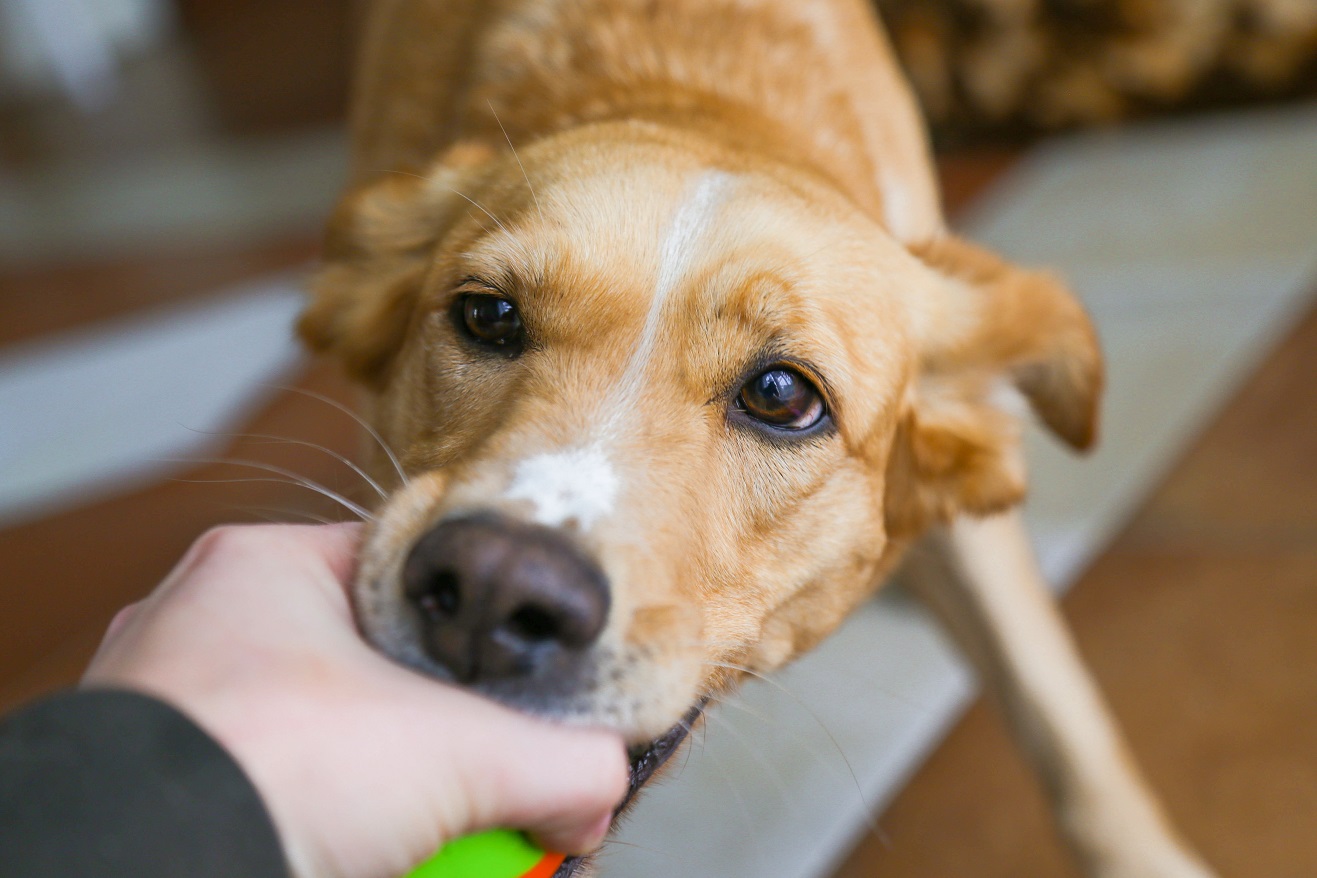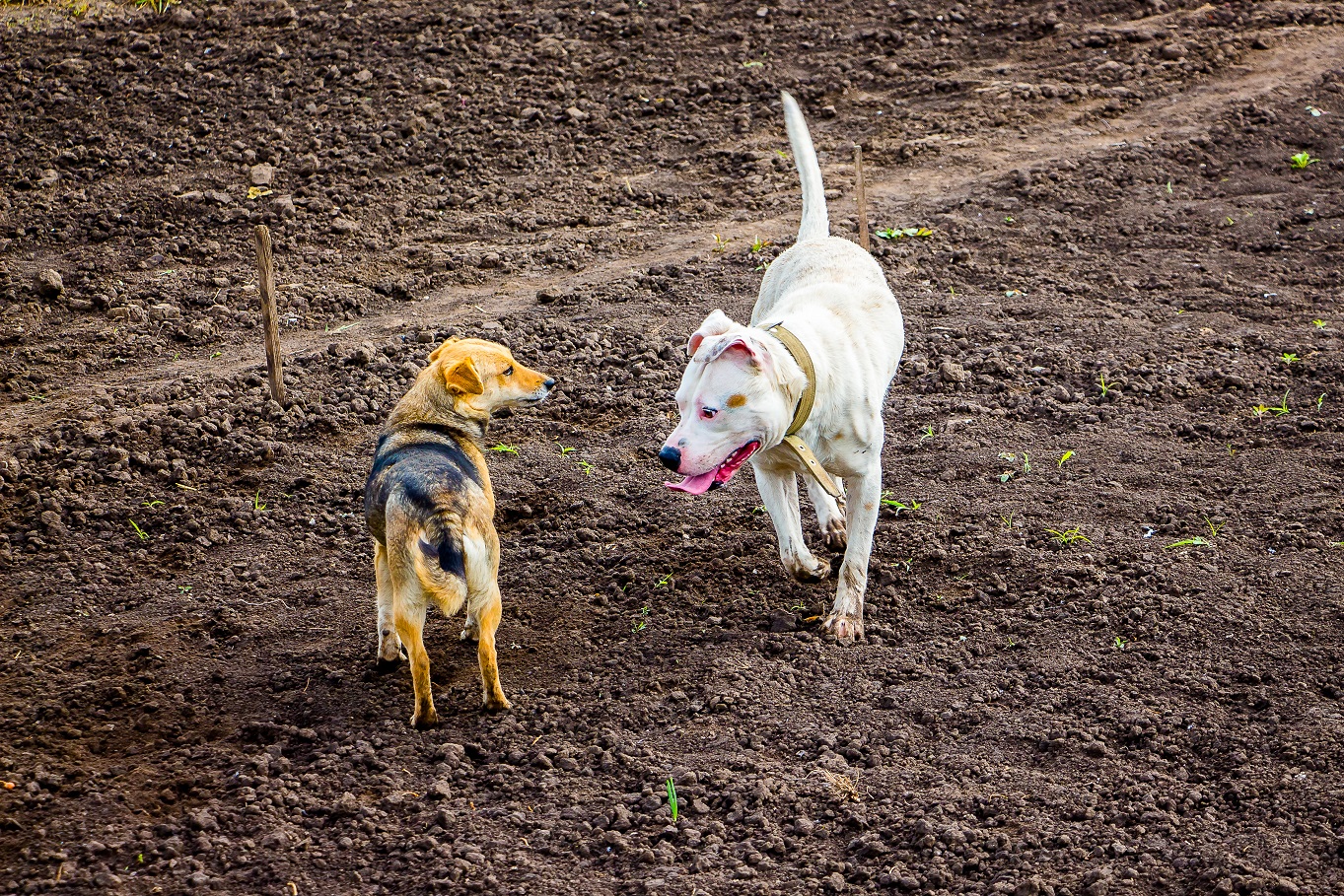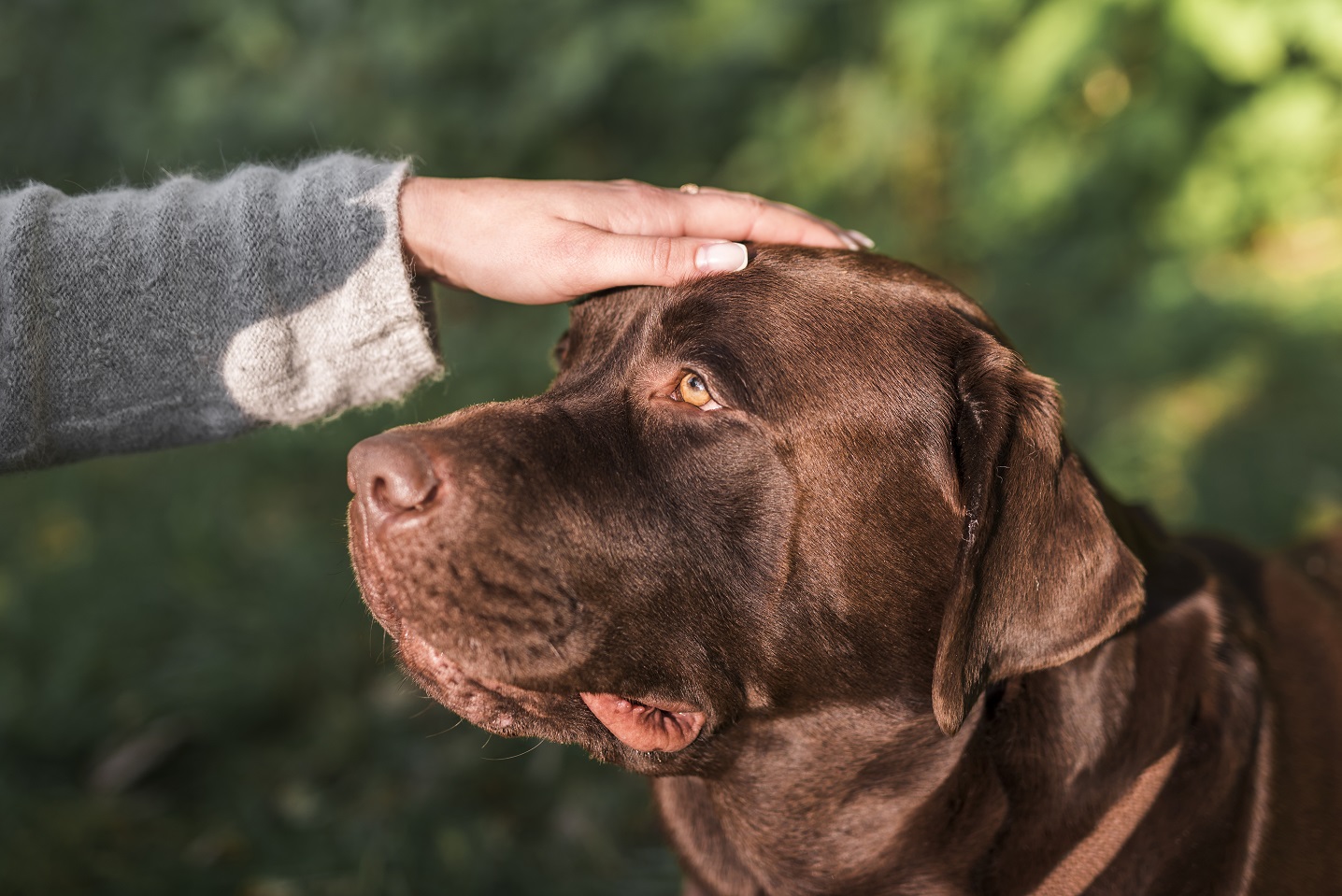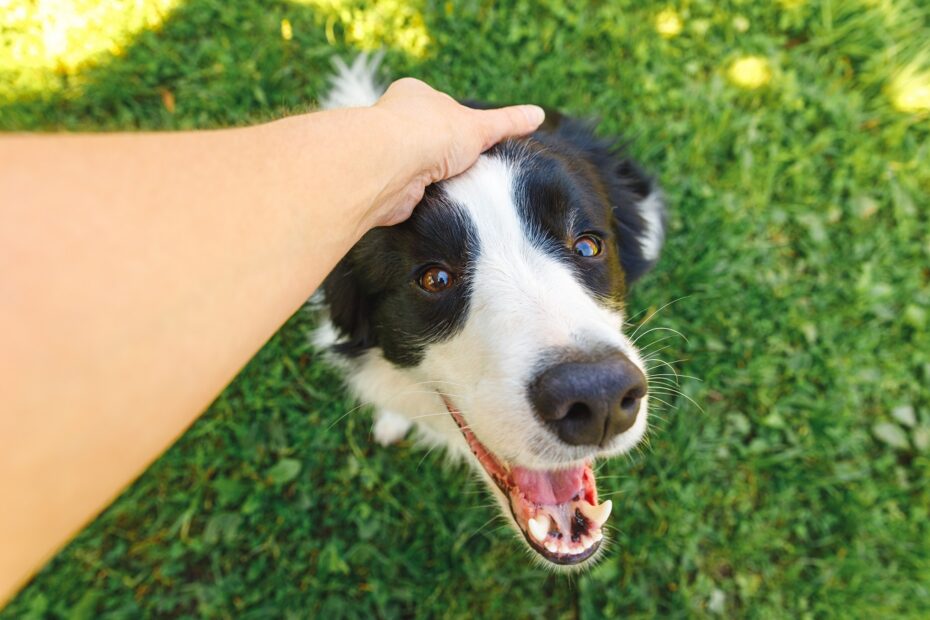‘Why does my dog bite me when I pet him?’… This is a question I’ve been asked more than once, and to be honest, there can be a lot of reasons for this potentially dangerous behavior.
Now, dog bites can take many forms. And while it doesn’t necessarily mean your dog lashes out and takes a big chunk out of your hand. It’s certainly a cause for concern and something you ideally need to rectify before it gets out of control.
This goes for a nibble, a chew, or perhaps even a slightly more aggressive bite; it doesn’t matter. It’s still something that needs to be addressed sooner rather than later.
See, petting your dog is one of the many pleasures of owning one. But it’s also something you should be able to enjoy without running the risk of getting injured!
So in today’s blog post, I’m going to be talking about some of the more common reasons why your dog might try to bite. Along with a few techniques you can impliment to put an end to the behavior once and for all.
Now, before we get into the nitty-gritty of why dogs bite. It’s first important to understand that biting, aggression, or any behavioral issue for that matter, is simply a side effect of your dog is not in control of their emotions.
Teach your dog emotional control, and the process of permanently eliminating unwanted biting becomes a lot easier.
So before moving on, I’d highly recommend taking a few minutes to check out these 5 step-by-step calming exercises from Dan Abdelnoor over at The Online Dog Trainer. (see video below)
In the video, Dan goes into great detail on some of the reasons why your dog behaves the way they do.
And while it’s not an overnight fix for your dog’s obsessive biting habit. I guarantee that if you practice each exercise consistently, you’ll see a vast improvement in your dog’s behavior sooner rather than later.
Anyway, here’s the link to take a look: 5 Step-By-Step Calming Exercise To Quickly Stop Your Dogs Unwanted, Aggressive Biting Habit…
(video will open in a new window)
Why does my dog bite me when I pet him?
Now, as well as dog bites being painful, they can also be potentially upsetting to some owners. Especially when all you want to do is show your dog love and affection.
But it’s important to stress that it’s not necessarily personal. And the reasoning behind the behavior isn’t as straightforward as the fact that he just doesn’t like you.
So let’s look at some of the more common reasons your dog could be acting out…
Bad past experiences
If you’ve recently adopted a rescue dog, there’s always a chance that of some previous behavioral issues that you’re not aware of.
This isn’t something to alarm you; it’s just important to know.
But before your dog was welcomed into your home, he might have had some negative experiences when it came to being touched or petted.
Harsh as it might sound, this is something that is totally out of your control. However, if your dog does associate petting with a past traumatic experience, biting may just be a sign of fear or anxiety.
They’re used to being touched
Although it might sound strange to some owners who shower their pets with love, the reality is that some dogs have never experienced affection from human beings.
Dogs that have been rescued from poor conditions or even former working dogs may not have experienced human interaction in the same way that other, more domesticated dogs have.
For them, being petted or touched feels unnatural, and their instinct is perhaps to lash out in fear or to defend themselves.
If this is the case, it will take your dog time to adapt to being touched and require patience while your dog learns to trust you.
They prefer to be left alone
Just like some humans are introverts and prefer to be left alone, the same can be true for dogs.
For some dogs, petting is an invasion of their private space, and they simply don’t want to be touched or bothered.
While this can be difficult for some owners to accept, you need to respect your dog’s boundaries and leave them to their personal space.
In time (and as you develop a bond), their barriers will eventually start to come down, and they’ll be more willing for you to make contact.
You’ve unknowingly aggravated them
Unfortunately, we can’t always work out precisely what is upsetting our dog. So there’s always a chance that you unknowingly did something to promote the behavior.
And even though you most likely didn’t intend to, you might have provoked your dog into biting you.
For instance, if your dog has only bit you once or twice when you’ve reached out for a stroke, this is a clear sign that he’s upset with you about a particular incident.
They’re in pain
Never rule out that your dog could simply be acting out due to pain related issues. Because not only will this make him naturally irritable, you may also be attempting to touch a sensitive spot where the pain resides.
The end result? …He’s much more likely to lash out and bite.
If this is the case and you suspect that your dog is biting you because of pain, it’s best to call the vet and make an appointment as soon as you can.
As you can see, there are lots of reasons why your dog might attempt to bite. And while every dog has their reasons for lashing out, it’s still something that (if not addressed quickly) could cause serious damage to both you and your dog.
Quickly changing your dog’s behavior patterns is something Dan talks about in great detail when introducing the 5 step-by-step calming exercises into your dog’s routine.
Because not only will they help your dog calm. They’ll also teach your dog how to be more sociable and responsive in any type of situation that triggers it (including petting).
So before moving on, make sure you take a look…

How To Stop Your Dog Biting When Petted
Now, even though it’s only natural to want to change your dogs’ biting habits, you also need to remember that nothing happens overnight.
But when it comes to changing the way your dog behaves, here are a few tried and tested things you can attempt to help your dog get more used to being petted…
Spend more time bonding with your dog
It sounds obvious, I know, but if your dog isn’t used to human interaction, there’s a chance that they might respond by lashing out to your approaches.
Even something as innocent as trying to stroke your dog’s head or ears can set the alarm bells ringing, and it can cause your dog to stress out or panic.
A way to change the way your dog reacts to such advances is to simply spend more time with them.
This doesn’t mean you have to be in your dog’s face all day, either. You can start slowly by spending time in the same room as him or just speaking to him more throughout the day.
This is particularly important if you have an anxious dog that’s not used to human interaction. Because by showing your dog that you’re not a risk and nothing to be feared, they’ll eventually get used to the idea of letting you pet them once they have established trust.
Socialize them
Socializing your dog is a vital stage in their development.
So if your dog wasn’t socialized well when he was a puppy. Chances are he’s developed some worrying behaviors now he’s a fully-grown adult.
Socialization doesn’t need to be difficult either. In fact, most of the time, all it takes is a little effort on your part to help them become familiar with different environments by introducing them to other people and other dogs.
And as you expose your dog to new stimuli, you will be surprised at how much they develop.
Not only that, socialization dramatically increases your dog’s confidence which makes them much more responsive to regular interaction.
And when your dog is more confident and more trusting, they are much more likely to allow you to pet them.
Related Post: How To Socialize An Aggressive Dog – A Step By Step Guide

Pay attention to your surrounding
To fully understand why your dog is biting, it always helps to pay close attention to your surroundings to see if there’s anything in particular that’s triggering the behavior.
Take a minute to think about the following:
- Does your dog bite you at a particular time of the day? For instance, when he’s waiting for meals or ready to go out for a walk?
- Does your dog show aggression when it’s just you or when there are other people around? Or does the biting occur when other dogs approach when you’re out for a walk?
- Do you try and pet your dog when he’s asleep or resting? Or maybe even when he’s playing with a particular toy?
Think carefully here and really consider what could be causing the outburst. Because once you identify patterns in your dog’s behavior (for example, if you’re getting bitten when your dog is resting or trying to sleep). It can often indicate a clear sign of what’s causing the issue.
For instance, some dogs get scared easily, and biting is an instinctive reaction to that fear.
Or if your dog bites around mealtime, they might have a resource guarding issue where they become incredibly possessive or territorial over their food.
Whatever it is, if you spend some time understanding the circumstances around when your dog bites, you can then avoid petting them in potential situations where they are likely to bite you.
Teach your dog to be calm
Biting is usually a sign of a more deep rooting issue in your dog like fear, anxiety, stress, or aggression.
And while the above techniques are a great starting point for getting to grips with the issue. The most important thing you can do to help your dog overcome their obsessive biting habit is to simply teach them to be calm.
However, teaching your dog to be calm isn’t a case of just ignoring the behavior and hoping it goes away. It’s about understanding your dog and knowing what triggers him and why.
This is something that Dan talks about extensively in the 5 step-by-step calming exercises I mentioned earlier.
And once you start implementing them into your routine consistently, you’ll quickly find your relationship with your dog significantly improves.
Which, in time, will ultimately lead to you being able to pet your dog without fear of getting bitten.

Wrapping Things Up
Not being able to pet your dog out of fear of getting bitten is undoubtedly upsetting.
And although it can hard to pinpoint the reasons why. It’s not definitely shouldn’t just put up with it and hope it goes away.
As the owner (and leader of the pack), it’s your responsibility to work with your dog to make sure their behavior doesn’t spiral out of control.
The good news?
With a little bit of patience (and applying a little bit of calm), your dog’s biting habits will soon be a thing of the past.

